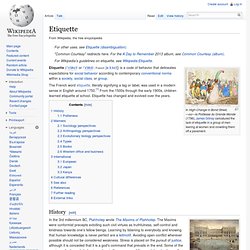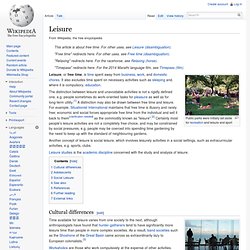

Media. 11. International Factors. 12. Social factors. 9. Cultural & Social factors. Sussex County FA. 10. Opportunities for Further involvement. Youth Sport Trust - Youth Sport Trust. 8. Organisation influences. 7. School & Physical Education. Etiquette. In High-Change in Bond Street,—ou—la Politesse du Grande Monde (1796), James Gillray caricatured the lack of etiquette in a group of men leering at women and crowding them off a pavement.

The French word étiquette, literally signifying a tag or label, was used in a modern sense in English around 1750.[1] From the 1500s through the early 1900s, children learned etiquette at school. Etiquette has changed and evolved over the years. History[edit] In the 3rd millennium BC, Ptahhotep wrote The Maxims of Ptahhotep. The Maxims were conformist precepts extolling such civil virtues as truthfulness, self-control and kindness towards one's fellow beings. Confucius (551–479 BC) was a Chinese teacher, editor, politician, and philosopher whose philosophy emphasized personal and governmental morality, correctness of social relationships, justice and sincerity. Politeness[edit] Members of a Gentlemen's club had to conform to a socially acceptable standard of politeness. Manners[edit] Types[edit] Books[edit] Sport England. DKH Legacy Trust. The website for the English Football Association, The FA Cup and the England football team.
Welcome to the Official Site of the Rugby Football Union, Governing English Rugby. SPORTS ORGANISATIONS 8mark question-1. Organisations Examination Questions. Emotional Health & Well Being Scenarios. The Character of Brian Davis. BBC Sport - Get Inspired. Honour and etiquette. Healthy food & activity tips for you & your kids. A balanced diet - Live Well. Despite what you see in some diet books and TV programmes, healthy eating can be really straightforward.

Food groups All the food we eat can be divided into five groups. Try to choose a variety of different foods from the first four groups. They are: Fruit and vegetables. Most people in the UK eat and drink too many calories, and too much fat, sugar and salt, and not enough fruit, vegetables and fibre. 1. Fruit and vegetables are a vital source of vitamins and minerals.
There's evidence that people who eat at least five portions a day are at lower risk of heart disease, stroke and some cancers. What's more, eating five portions is not as hard as it might sound. Having a sliced banana with your morning cereal is a quick way to get one portion. See 5 A DAY for more tips to help you get your five portions of fruit and veg. 2. Starchy foods should make up around one third of everything we eat. Leisure Time. Who plays sport? Sport England’s data for 2012/13, compared to 2005/6, shows: more men and women are taking partincreased numbers of disabled people are taking partstatistically significant increases in six out of the nine English regionsincreases among both black and minority ethnic and white British adultsmore people from every socio-demographic group taking part.

Key factors Gender, age and socio-economic group have a big influence on sports take-up. More men play sport than women. Currently 40.9% of men play sport at least once a week, compared to 30.8% of women. Bend it Like Beckham Trailer. Nhss_parents-carers-guide. Eatwellplate. Food in Schools. Social and Cultural Factors. The Family. Billy Elliot Trailer. Establishing_School_Policy. Leisure. Public parks were initially set aside for recreation and leisure and sport Leisure, or free time, is time spent away from business, work, and domestic chores.

It also excludes time spent on necessary activities such as sleeping and, where it is compulsory, education. The distinction between leisure and unavoidable activities is not a rigidly defined one, e.g. people sometimes do work-oriented tasks for pleasure as well as for long-term utility.[1] A distinction may also be drawn between free time and leisure. Another concept of leisure is social leisure, which involves leisurely activities in a social settings, such as extracurricular activities, e.g. sports, clubs. Leisure studies is the academic discipline concerned with the study and analysis of leisure. Cultural differences[edit] Time available for leisure varies from one society to the next, although anthropologists have found that hunter-gatherers tend to have significantly more leisure time than people in more complex societies.
Unit 3.1.3 Making informed decisions about getting involved.